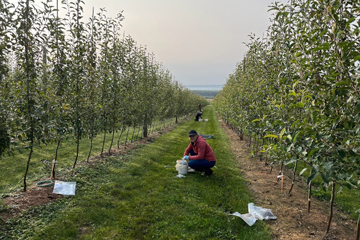
AAFC researchers in Living Lab – Nova Scotia collecting soil samples from orchards during the Fall of the 2023 growing season.
Farmers across Canada have been no strangers to extreme weather over the past number of years – from hurricanes, drought, floods, fires, spring frosts and the impact of polar vortices. To mitigate the impacts of climate change, farmers have been adapting their practices and finding new ways to make their operations more competitive and sustainable. The 10-year Agricultural Climate Solutions – Living Labs (ACS-LL) program funded by Agriculture and Agri-Food Canada (AAFC) enables farmers, researchers and other collaborators to join forces in co-developing, testing, and evaluating innovative practices and technologies to reduce environmental footprints and enhance climate resiliency.
Among AAFC's nationwide network of 14 living labs is Living Lab – Nova Scotia. Led by the Nova Scotia Federation of Agriculture (NSFA), this five-year project was announced in 2022 with up to $4.5M in funding from AAFC. Living Lab – Nova Scotia's activities focus on developing innovative agricultural management practices in four areas:
- orchard and vineyard floor management
- cover crops in annual systems
- riparian zones and shelterbelts
- land swapping.
Each activity focuses on different innovations that are co-developed, tested and evaluated with farmers in Nova Scotia to increase soil carbon sequestration, mitigate greenhouse gas (GHG) emissions and provide other environmental co-benefits. Finally, a socio-economic study will examine the integrated impacts of these four activities. Partners from Acadia University will collect data from participating and non-participating producers to better understand the costs and the benefits of implementing the beneficial management practices, as well as what factors motivate a producer to invest, including both financial and non-financial considerations. Ultimately, the socio-economic study will help accelerate the adoption of sustainable on-farm practices and technologies to tackle climate change.
"Living Lab – Nova Scotia really highlights the way that agriculture can play a role in mitigating climate change. These practices will continue to make the agriculture industry in Nova Scotia thrive", said Carolyn Marshall, Environment & Climate Change Manager at NSFA.
Nova Scotia farmers are actively working side-by-side with research partners from NSFA, Perennia, Clean Annapolis River Project, Dalhousie University, Saint Mary's University, Cape Breton University, and Acadia University, as well as AAFC on the four activities. Together, the groups are contributing knowledge and experience, to innovate right on the farmer's fields.
"I would like to see us develop some beneficial management practices that we can make industry standards by reducing our carbon footprint but also creating new ways to sequester carbon, increase soil health and fertility in our cropping systems", says participating farmer Steve Ells.
The AAFC research team, co-led by Dr. Erin Smith and Keith Fuller of the Kentville Research and Development Centre, is leading one of the four activities in the Living Lab – Nova Scotia. Their research activity focuses on testing innovative orchard and vineyard floor management practices that have been co-developed with growers to assess how these practices can enhance carbon sequestration and mitigate GHG emissions in two of Nova Scotia's woody perennial crops: apples and grapes. The AAFC research team, in collaboration with the farmers, will continue to test, evaluate and improve on these innovative practices, with the goal to alleviate the impacts of climate change, improve soil health, pest and disease management, and biodiversity.
"Each farm participating in the living lab project is a testament to what can be achieved when scientists and growers work together towards a common purpose", says Keith Fuller. "Together, we strive to reduce the sector's carbon footprint, through innovation and quicker adoption of best management practices."
If you would like to stay up to date and learn more about the other Living Lab – Nova Scotia activities, please visit NSFA's Living Lab – Nova Scotia website.
Get more Agri-info
- Want more stories like this? Explore what else Agri-info has to offer.
- Interested in reporting on this story? Contact AAFC Media Relations at aafc.mediarelations-relationsmedias.aac@agr.gc.ca to arrange an interview with one of our experts.